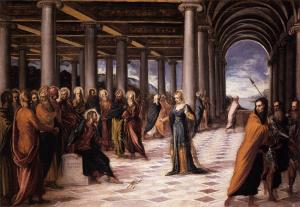
Jesus, was asked what should be done concerning a woman caught in adultery. Those who asked him said that the law indicated she must be put to death (cf. Lev. 20:10). The law, they believed, promoted the death penalty and to execute the law then required the woman’s death. What, then, would Jesus suggest? Would he agree to stoning the woman? No, because Jesus understood things differently:
Early in the morning he came again to the temple; all the people came to him, and he sat down and taught them. The scribes and the Pharisees brought a woman who had been caught in adultery, and placing her in the midst they said to him, “Teacher, this woman has been caught in the act of adultery. Now in the law Moses commanded us to stone such. What do you say about her?” This they said to test him, that they might have some charge to bring against him. Jesus bent down and wrote with his finger on the ground. And as they continued to ask him, he stood up and said to them, “Let him who is without sin among you be the first to throw a stone at her.” And once more he bent down and wrote with his finger on the ground. 9 But when they heard it, they went away, one by one, beginning with the eldest, and Jesus was left alone with the woman standing before him. Jesus looked up and said to her, “Woman, where are they? Has no one condemned you?” She said, “No one, Lord.” And Jesus said, “Neither do I condemn you; go, and do not sin again” (Jn. 8: 2-11 RSV).
Jesus rejected the use of the death penalty; he did not condemn the woman, despite the way it appeared she should be condemned by the law. Was Jesus acting contrary to the law? Was he acting contrary to what was dictated by God through Moses? No, but he did go against the way many interpreted the law. He understood the Law of Moses and what came after in the prophets served to represent him and speak of him (cf. Jn 5:46). As Paul indicated, the law had to be properly interpreted. When the rules of the law are read as absolutes which must be taken “literally,” they only lead to death, but when read spiritually, they give life. They are meant to be life-affirming; they must not be read as promoting the destruction of any life:
Such is the confidence that we have through Christ toward God. Not that we are competent of ourselves to claim anything as coming from us; our competence is from God, who has made us competent to be ministers of a new covenant, not in a written code but in the Spirit; for the written code kills, but the Spirit gives life. Now if the dispensation of death, carved in letters on stone, came with such splendor that the Israelites could not look at Moses’ face because of its brightness, fading as this was will not the dispensation of the Spirit be attended with greater splendor? For if there was splendor in the dispensation of condemnation, the dispensation of righteousness must far exceed it in splendor. Indeed, in this case, what once had splendor has come to have no splendor at all, because of the splendor that surpasses it. For if what faded away came with splendor, what is permanent must have much more splendor (2 Cor. 3:4-11 RSV RSV).
God was at work in human history, guiding humanity as a teacher, giving them elementary teachings which were later modified and developed with later teachings until, at last, he came to give the final and ultimate revelation in and through himself, that is, in the incarnate God-man Jesus Christ. Teachers know the limits of what their students can learn and understand at a given time, and will speak accordingly. Those who study higher mathematics learn how to deal with categories of thought and kinds of equations they were told were impossible earlier: calculus is able to answer questions which simple arithmetic cannot.
Moses, and the prophets, all gave direction to the people of Israel (and through them, humanity) in order to have them properly understand God, what God wants for humanity, and what God will do with and for humanity. God engaged the people of Israel where they were at, and began regulating their actions, so that they could be moved slowly away from those practices which he didn’t want them to engage. He allowed sacrifices, but he regulated them so as to begin to limit their use; later, once such regulation was accepted, he was able to tell the people of Israel he made temporary accommodations for them, for in reality, he did not want or need such sacrifice” “What to me is the multitude of your sacrifices? says the LORD; I have had enough of burnt offerings of rams and the fat of fed beasts; I do not delight in the blood of bulls, or of lambs, or of he-goats” (Isa. 1:11 RSV). What he wants, what was hinted at in such sacrifices and why they could be used for a temporary basis, was love: “For I desire steadfast love and not sacrifice, the knowledge of God, rather than burnt offerings” (Hos. 6:6 RSV). God did not desire or want sacrifice, but he allowed it in order to regulate and control the impulse of the people to offer him sacrifice. They thought it was required of true religious worship and if they were not accommodated at the time, they would have strayed farther from God than they did (after all, isn’t that a part of the lesson we learn from the story of the Golden Calf?). Eventually, the people of Israel would no longer feel the need to offer them. They would be able to find their proper relationship with God in and through what is symbolized by such sacrifices, that is love (for the character of love is sacrificial in nature, as a lover will think of their beloved and their needs over their own particular wants and needs).
Thus, Jesus, the God-man, giving the final revelation of the truth of God in his person, was able to explain God’s desire for humanity as exemplified in the Law of Moses. The Law was meant to regulate and limit the evil people could and would do in the name of justice, but sadly, instead of using it to limit their impulses, many have legalistically taken the letter of the law instead of its spirit, and used it to fight against the ideal of the law and promote the very evils which it was meant to prohibit. In the same way some people have taken “just war” as a way to create more wars, so many took the law, which was meant to promote the common good, the dignity of the human person, and life itself, as a way to justify the exact opposite. Jesus, when confronted with such an ideology, denied it:
“You have heard that it was said, `An eye for an eye and a tooth for a tooth.’ But I say to you, Do not resist one who is evil. But if any one strikes you on the right cheek, turn to him the other also; and if any one would sue you and take your coat, let him have your cloak as well; and if any one forces you to go one mile, go with him two miles. Give to him who begs from you, and do not refuse him who would borrow from you (Matt. 5:38 -42 RSV).
Those who would try to use Scripture to justify the death penalty do not listen to Jesus. They ignore the spirit and intent of the law and turn the law against itself in doing so. They promote “an eye for an eye” instead of Jesus’ “resist evil.” The whole point is to resist evil, not to justify it through the dictates of the law. Jesus denied the death penalty (as he refused to condemn the adulteress); he denied the principle of vengeance which is often used to support the death penalty (as he denied the way people interpreted “an eye for an eye”). He affirmed the point of the law which is to overcome evil, especially the evil which we would commit ourselves. We must go and sin no more. If taking and destroying the image of God in humanity is a sin, then destroying any human life is a sin. But because Moses came from a time blood debt and blood feuds, the law of Moses served as an educator, to get people away from such a simplistic, bloodthirsty approach, just as it served as an educator to slowly get people away from thinking God needed and desired literal sacrifices (human and animal alike). It must be read and understood as a pointer to the desired end God had for humanity, and not as the end point itself. Because what is being demonstrated and pointed out by the law is true, the law is true and all those who properly follow the law are following the truth. Nonetheless, when Christians go back to the pointer and literalize it, they show they misunderstand the pointer and the lesson involved with it (and this is especially a problem for Christians, because Jewish theology clearly shows it understands this in its post-temple traditions).
“See that none of you repays evil for evil, but always seek to do good to one another and to all” (1 Thes. 5:15 RSV). Death is an evil. Destroying someone else, killing them, because they have done evil, runs contrary to the Christian faith. We must seek their good. We must not repay evil with evil. This is one of the many reasons why the Christian faith, when it is properly lived out, stands against the death penalty. And this is as it should be, for Christians follow the God of love, the God who gives life and desires not that any should perish but that all should have everlasting life. What is done in contrast to this desire of God stands against God. It is understandable that before the final revelation of the triumph of life over death in the resurrection, this lesson, this understanding, was still emerging in human history; but after the resurrection, Christians must not go back and try to push for the way things used to be. For in doing so, they repudiate the lesson of the resurrection itself.
Stay in touch! Like A Little Bit of Nothing on Facebook.
If you liked what you read, please consider sharing it with your friends and family!













